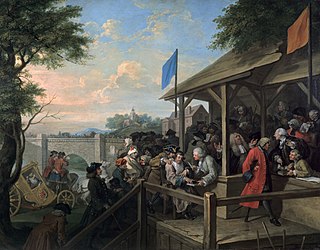In politics, a red–green alliance or red–green coalition is an alliance of "red" parties with "green" parties. The alliance is often based on common left political views, especially a shared distrust of corporate or capitalist institutions. While the "red" social-democratic parties tend to focus on the effects of capitalism on the working class, the "green" environmentalist parties tend to focus on the environmental effects of capitalism.

Political colours are colours used to represent a political ideology, movement or party, either officially or unofficially. They represent the intersection of colour symbolism and political symbolism. Politicians making public appearances will often identify themselves by wearing rosettes, flowers, ties or ribbons in the colour of their political party. Parties in different countries with similar ideologies sometimes use similar colours. As an example the colour red symbolises left-wing ideologies in many countries, while the colour blue is often used for conservatism, the colour yellow is most commonly associated with liberalism and right-libertarianism, and Green politics is named after the ideology's political colour. The political associations of a given colour vary from country to country, and there are exceptions to the general trends, for example red has historically been associated with the Christian Church, but over time gained association with leftist politics, while the United States differs from other countries in that conservatism is associated with red and liberalism with blue.

The Pacifist Socialist Party was a democratic socialist Dutch political party. The PSP played a small role in Dutch politics. It is one of the predecessors of GroenLinks.

The Communist Party of the Netherlands was a Dutch communist party. The party was founded in 1909 as the Social-Democratic Party (SDP) and merged with the Pacifist Socialist Party, the Political Party of Radicals and the Evangelical People's Party in 1991, forming the centre-left GreenLeft. Members opposed to the merger founded the New Communist Party of the Netherlands.

The Evangelical People's Party was a minor progressive Protestant political party in the Netherlands. It is one of the predecessor parties of the modern-day GreenLeft.

The Political Party of Radicals was a Christian-radical, progressive Christian and green political party in the Netherlands. The PPR played a relatively small role in Dutch politics and merged with other left-wing parties to form GreenLeft in 1991.
A political international is a transnational organization of political parties having similar ideology or political orientation. The international works together on points of agreement to co-ordinate activity.
This article gives an overview of socialism in the Netherlands, including communism and social democracy. It is limited to communist, socialist, social democratic, and democratic socialist parties with substantial support, mainly proved by having had a representation in parliament. The sign ⇒ means a reference to another party in that scheme.

The Alliance of Progressives was a left-wing political alliance of parties in Italy formed in 1994, with relevant predecessors at local level in 1993. The leader of the alliance was Achille Occhetto. The alliance was a predecessor of the modern-day centre-left coalition.

The Netherlands is a European Parliament constituency for elections in the European Union covering the member state of Netherlands. It is currently represented by twenty-nine Members of the European Parliament. Until the 2009 European Parliament election, it excluded the Dutch in the Netherlands Antilles and Aruba.
The term green left refers primarily to a political affiliation that combines elements of green politics and left-wing politics in countries where the term is used. It is primarily a social justice and human rights oriented ideology, with an expansion in focus to the rights of other species. It is often used in contrast with center-left green parties, that attempt to reconcile their environmental goals with a capitalistic framework, and, rarely, center-right green parties, that hold anti-feminist views.
The centre-left coalition is a political alliance of political parties in Italy active under several forms and names since 1995, when The Olive Tree was formed under the leadership of Romano Prodi. The centre-left coalition has ruled the country for more than fifteen years between 1996 and 2022; to do so, it had mostly to rely on a big tent that went from the more radical left-wing, which had more weight between 1996 and 2008, to the political centre, which had more weight during the 2010s, and its main parties were also part of grand coalitions and national unity governments.
Progressivism in South Korea is broadly associated with social democracy, cultural progressivism and left-wing nationalism. South Korea's "progressivism" is often used in a similar sense to 'South Korean Left' or 'leftist'.